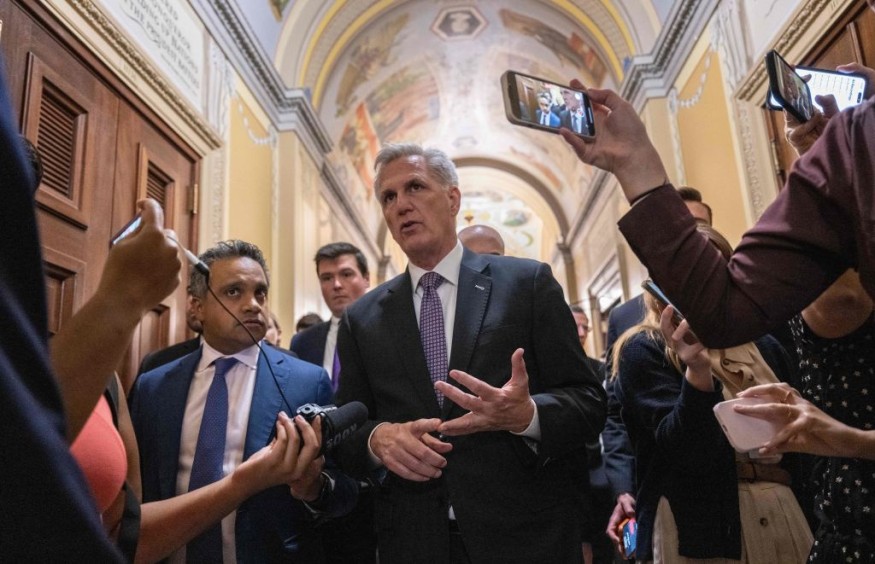US Debt Ceiling Talks Take Bad Turn Amid Spending Issues

Talks to raise the US debt ceiling between House Speaker Kevin McCarthy's office and the White House encountered an obstacle on Friday night, as reported by multiple sources to CNN.
Nevertheless, negotiations resumed on Capitol Hill later that evening. McCarthy confirmed his participation in the meeting and expressed his continued frustration with the White House's position. CNN also received information from a source involved in the talks, suggesting a meeting between the two parties was imminent.
Optimism for reaching a preliminary agreement over the weekend was shattered following a brief gathering of negotiators at the Capitol building on Friday.
Republican Representative Dusty Johnson, who chairs the moderate Main Street Caucus and supports McCarthy, indicated that spending cutbacks were the primary point of contention.
"We are too far apart on the topline number," stated Johnson earlier in the day, referring to the level of discretionary spending for fiscal year 2024.
He further emphasized McCarthy's unwavering stance, noting his awareness of the Republican conference's position while highlighting the White House's failure to grasp Washington's spending problem.
"The gap on topline numbers is not the only problem, but it's the biggest problem," he added.
READ NEXT : Joe Biden Quashes US Debt Default
Time Is Running Out for US Debt Ceiling
The looming risk of the federal government's inability to meet its financial obligations by June 1 has been highlighted by the Treasury Department. With less than two weeks remaining until this critical date, the potential for a US debt default poses significant repercussions for global financial markets, according to Reuters.
To raise the government's self-imposed borrowing limit, a monthly necessity to cover expenses resulting from past spending and tax cuts, Republicans are demanding substantial reductions in government expenditure.
House Speaker Kevin McCarthy expressed his concern about the lack of progress in negotiations, stating, "We've got to get movement from the White House, and we don't have any movement yet. We can't be spending more money next year. We have to spend less than the year before."
A White House official acknowledged the challenging nature of budget discussions, citing substantial differences between the parties. President Joe Biden's team is actively striving to find a reasonable bipartisan solution that can gain approval in both the House and the Senate.
The news of the impasse in negotiations cast a negative shadow over US stocks as the week ended. The current composition of the House of Representatives stands at a 222-213 majority in favor of the Republican Party, while the Senate is under Democratic control, with a slim 51-49 margin.
Republicans advocate for a return to spending levels observed in 2022, while Democrats argue for maintaining the current year's levels. Recently, the House passed a bill to implement an across-the-board 8% reduction in government spending for the upcoming fiscal year.
Although the specific areas of spared government expenditure remain uncertain, several Republicans have pledged to safeguard funding for the military and veterans.
Notably, leading Republicans have not disputed the Democrats's claim that such measures would entail average cuts of 22% to domestic programs like education and law enforcement.
Pres. Joe Biden Cut Japan Trip for US Debt Ceiling Negotiations
President Joe Biden, attending the G-7 leaders' summit in Japan, decided to cut his trip short to return home on Sunday and resume negotiations, CNBC reports.
While the House and Senate adhered to their weekend departure schedules, the Senate is expected to reconvene in the final week of May. Nevertheless, Senate Majority Leader Chuck Schumer, a New York Democrat, has urged senators to be prepared to return to Washington, if necessary.
This week, investors have been closely monitoring developments in Washington, hoping for progress in the prolonged US debt ceiling impasse. Treasury Secretary Janet Yellen warned earlier this month that the United States could exhaust funds to cover existing government bills as early as June 1.
Consequently, talks that had been largely dormant since February have suddenly gained a renewed sense of urgency, catching both the White House and Wall Street off guard.
Following an unproductive meeting with congressional leaders at the White House on Tuesday, Biden appointed two of his closest aides to lead the negotiations.
Presidential counselor Steve Ricchetti and Office of Management and Budget director Shalanda Young were chosen by Biden for their exceptional intelligence and expertise, according to House Speaker Kevin McCarthy.
READ MORE : US-Mexico Border Crisis
This article is owned by Latin Post.
Written by: Bert Hoover
WATCH: Debt ceiling talks set to resume after temporary pause - From CBS News
Subscribe to Latin Post!
Sign up for our free newsletter for the Latest coverage!
© 2026 Latin Post. All rights reserved. Do not reproduce without permission.













